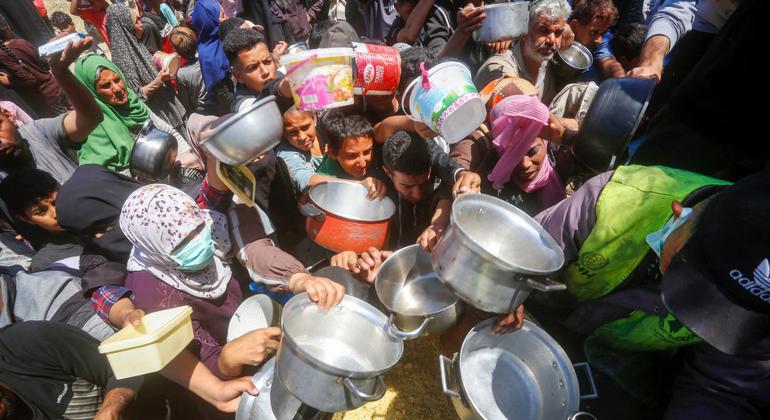Here’s the translation to American English:
The situation in Gaza has reached critical levels after two months of blockade by Israel, creating an unimaginable atmosphere of despair among its residents. The Office for the Coordination of Humanitarian Affairs has issued alerts about the devastating effects of this crisis, which is exacerbated by ongoing bombings in the region. Activist Olga Cherevko, who is currently in Gaza, describes scenes of people throwing stones as a water truck leaves, having exhausted its water supply.
The lack of potable water has become a trigger for violent clashes among the population, compelled to compete for this vital resource. Hunger, thirst, and disease are part of everyday life for civilians, who must also contend with violence. Cherevko recounts the harrowing story of a friend who witnessed people burned by explosions, unable to receive assistance due to the lack of water to extinguish the flames. The activist makes an urgent appeal to the international community for concrete actions to end the “ruthless blockade.” According to her, the future of the people of Gaza depends on our collective responsibility to act amid this endless crisis.
The outlook for refugees is no less discouraging. UNHCR has raised alarms about the severe impact of a financial crisis that has led to the closure of assistance programs in several countries. In Colombia, this threatens the documentation of nearly 500,000 Venezuelan migrants, while in South Sudan, 75% of assistance spaces for women and children have ceased operations, leaving around 80,000 victims of sexual violence in despair and helplessness.
Moreover, the situation is further complicated by the United States’ withdrawal from the refugee resettlement program, which has left a significant gap in global humanitarian aid. Elizabeth Tan, UNHCR’s Director of International Protection, expressed concern over the sense of hopelessness felt by many refugees, who see their opportunities for a better life diminishing.
Meanwhile, journalists in Gaza and the West Bank face a repressive system that endangers their ability to report. According to the UN, as of October 7, 2023, there have been 211 recorded journalist killings in Gaza, while access for international press remains restricted. In a scenario where press vests are no longer synonymous with protection, Palestinian journalists risk their lives to report on the devastation in their homeland.
The High Commissioner for Human Rights, Volker Türk, has raised concerns about the dangers of the increasing use of artificial intelligence, which is deployed as a tool for surveillance and censorship, threatening press freedom. Addressing the disproportionate impact on women journalists, Türk warns that control exerted by a few companies over this technology could amplify certain voices while silencing dissent, jeopardizing media plurality and the right to freedom of expression.
Referrer: MiMub in Spanish










